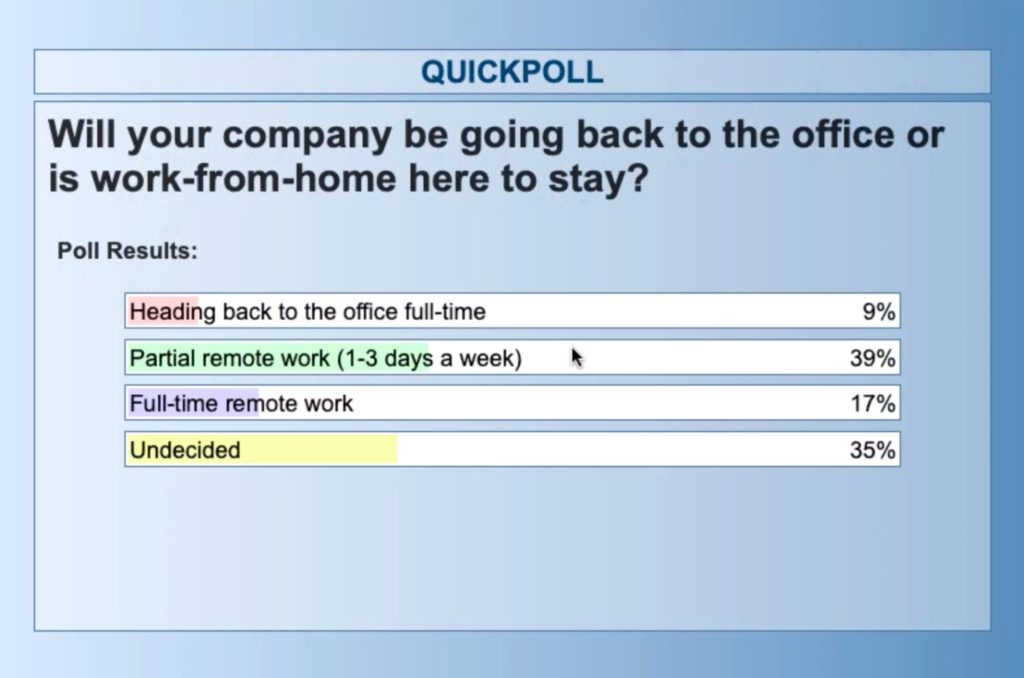
How Performance Management and Objective and Key Result Methodology Can Help HR Take Advantage of the Recovery
\If you’re like me, repeatedly hearing that tired and trite cliché – “the new normal” followed by what one person believes it is – over and over, every day, is probably wearing a bit thin. I get that we are in unprecedented times. However, quickly drawing conclusions from a global experiment involving the lockdown of billions of people and wide-scale pause of trillions of dollars of economic activity is neither helpful nor wise.
Indeed, a quick poll of over 150 HR professionals attending a webinar on remote working earlier this week revealed the following:

It is unclear what the “new normal” is from these responses and that is my point. We are living in an era of uncertainty and this requires that we look at the evidence and frameworks available that allow you to plan and pivot, but in a flexible and adaptable way. Research has shown that organizational cultures that thrive in uncertain environments support and encourage behavioral flexibility at all levels. The question is how do we get there or get better at it? I propose that we look at a process that is often misused and misunderstood: Performance Management.
In its simplest form, Performance Management has 3 chief purposes:
- Achievement of organizational strategic goals.
- Employee development
- Influence other processes: promotion, remuneration, rewards, etc.
We will just focus on the first two for now.
Achieving strategic goals in the current ever-changing and uncertain environment is challenging. In order to do so, you will need clarity, alignment, and accountability. These three words are at the heart of goal setting and maintaining a continuous performance management ecosystem. A few clear goals, communicated in a transparent manner, where every team/employee has the opportunity to align with these goals, and where progress is open and clear will help bring an element of certainty to both organizations and employees.
Employee development, especially in the area of individual, behavioral, and skills flexibility, is another area that organization and HR leaders must focus on to get by in these times of uncertainty. Actually, the best time to do this was two or three years ago. The second best time is now.
Done correctly, performance management can serve as the framework to help you not only survive these times of uncertainty but help you take advantage of the recovery before your competitors.
Still skeptical?
Well, come join us at InnovateWork #3 on May 26 and see if I can convince you with some real examples from my experience of surviving/thriving through 3 previous economic downturns, a hurricane that eliminated all commerce for 3 months, and Ebola while working in Western Africa.
After all, we shouldn’t “let a good crisis go to waste.”*
*Attributed to both Winston Churchill and Rahm Emanuel
About the Author
Bob St-Jacques is Director of Customer Success (17-19) and GM, Professional Services (2020) at 7Geese. He is an expert in successfully creating, improving, and transforming the People and Culture function including Employer Branding, Recruitment, Compensation Systems, Performance Management systems, Corporate Universities, Shared Services centres, and Centres of Expertise, at start-up and high-growth organisations.
He has created and implemented short, medium, and long-term human capital strategies linked to business initiatives, ranging from 3-month turnaround efforts to multi-year strategic plans. Bob has trained 3000+ employees and 2000+ supervisors, managers, and directors, including C-Suite executives, and Board members, in a multitude of areas: employment law, customer service, sales, communication skills, presentation skills, influencing and persuasion, negotiation, customer service, strategic planning, and leadership. He has also won 6 global and regional awards for recruitment and a regional award for a corporate university rollout.
